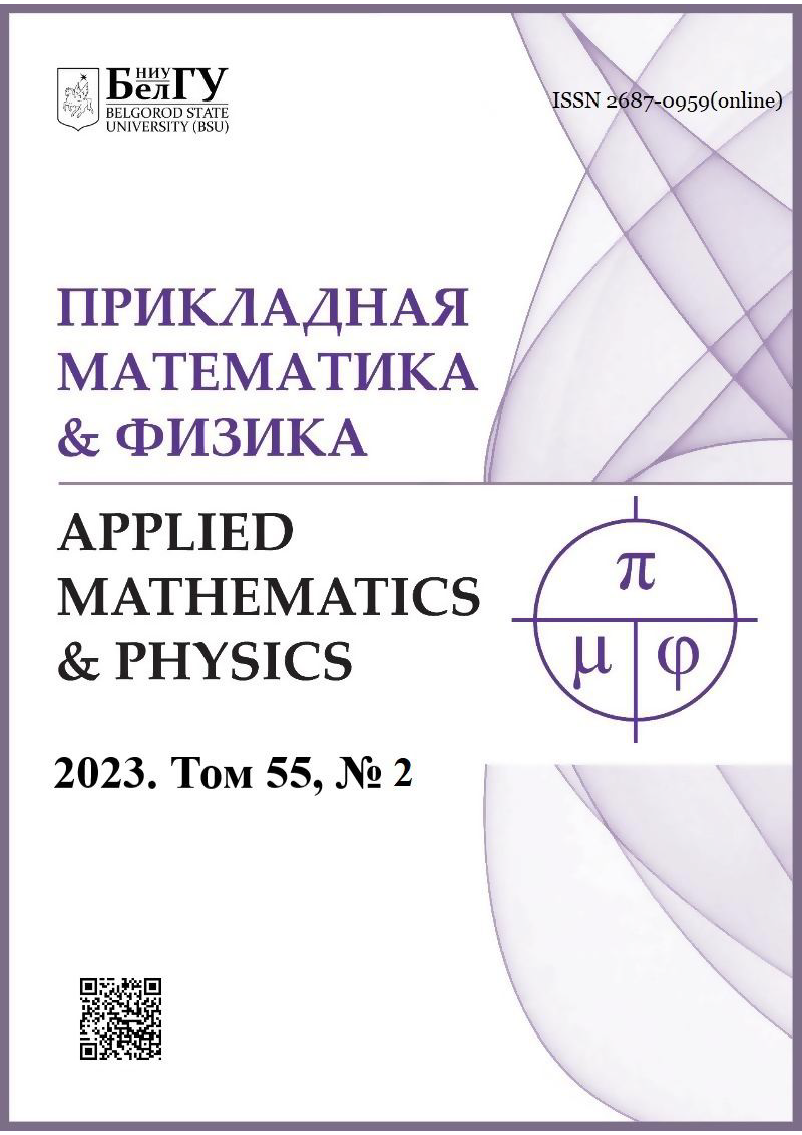Theoretical analysis of the work of josephson cryotrons
DOI:
https://doi.org/10.52575/2687-0959-2023-55-2-166-175Keywords:
Josephson Cryotron, Logic Element, LCJC (logical controlled Josephson contact), CryoelectronicsAbstract
Various schemes of operation of Josephson cryotrons, technologies for their manufacture and methods of operation are considered; the solution of questions of the stability of the operation of logic gates, which are based on the Josephson effect, and the maximum permissible geometrical parameters of the cryotron, have been studied. The volt-ampere characteristic of the Josephson cryotron with four stable operating modes has been constructed; a system of differential equations was compiled that determines the transient response of cryotrons with given parameters under conditions of helium and nitrogen temperatures; recommendations for improving the characteristics of Josephson cryotrons are proposed, and prospects for further research are outlined.
Downloads
References
–Р–ї—Д–µ–µ–≤ –Т. –Э., –С–∞—Е—В–Є–љ –Я. –Р., –Т–∞—Б–µ–љ–Ї–Њ–≤ –Р. –Р. 1985. –Ш–љ—В–µ–≥—А–∞–ї—М–љ—Л–µ —Б—Е–µ–Љ—Л –Є –Љ–Є–Ї—А–Њ—Н–ї–µ–Ї—В—А–Њ–љ–љ—Л–µ —Г—Б—В—А–Њ–є—Б—В–≤–∞ –љ–∞ —Б–≤–µ—А—Е–њ—А–Њ–≤–Њ–і–љ–Є–Ї–∞—Е. –Ь., –†–∞–і–Є–Њ –Є —Б–≤—П–Ј—М, 232.
–Ш–≥—Г–Љ–љ–Њ–≤ –Т. –Э. 2019. –Ю—Б–љ–Њ–≤—Л –≤—Л—Б–Њ–Ї–Њ—В–µ–Љ–њ–µ—А–∞—В—Г—А–љ–Њ–є –Ї—А–Є–Њ—Н–ї–µ–Ї—В—А–Њ–љ–Є–Ї–Є: —Г—З–µ–±–љ–Њ–µ –њ–Њ—Б–Њ–±–Є–µ. 2-–µ –Є–Ј–і., —Б—В–µ—А. вАУ –Ь–Њ—Б–Ї–≤–∞; –С–µ—А–ї–Є–љ: –Ф–Є—А–µ–Ї—В-–Ь–µ–і–Є–∞, 238.
–Я–∞—В–µ–љ—В RU 2298260 C1, H01L 39/24. 27.04.2007.
–Я–∞—В–µ–љ—В RU 2364009 C1, H01L 39/18. 10.08.2009.
–Я–∞—В–µ–љ—В RU 2080693 C1, H01L39/22. 27.05.1997.
–°–∞—В–ї–µ—А –Ю. –Э., –°–њ–Є—Ж—Л–љ –Р. –Ю. 2021. –Ь–µ—Е–∞–љ–Є–Ј–Љ –њ–Є–љ–љ–Є–љ–≥–∞ –≤ —В–µ—Е–љ–Њ–ї–Њ–≥–Є–Є –Ї–Њ–љ—В—А–Њ–ї—П —Б—В–∞—А–µ–љ–Є—П –Љ–∞—В–µ—А–Є–∞–ї–Њ–≤. –Ц—Г—А–љ–∞–ї —В–µ—Е–љ–Є—З–µ—Б–Ї–Є—Е –Є—Б—Б–ї–µ–і–Њ–≤–∞–љ–Є–є, 2: 53-65.
–°–њ–Є—Ж—Л–љ –Р. –Ю. 2020. –Ч–∞–Ї–Њ–љ–Њ–Љ–µ—А–љ–Њ—Б—В–Є —В—Г–љ–љ–µ–ї–Є—А–Њ–≤–∞–љ–Є—П –≤ —В–µ—Е–љ–Њ–ї–Њ–≥–Є—П—Е –Ї–Њ–љ—В—А–Њ–ї—П —Б—В–∞—А–µ–љ–Є—П –Љ–∞—В–µ—А–Є–∞–ї–Њ–≤ –Є –±–Є–Њ—Е–Є–Љ–Є—З–µ—Б–Ї–Њ–є —Н–≤–Њ–ї—О—Ж–Є–Є. –Э–∞—Г—З–љ—Л–є –∞–ї—М–Љ–∞–љ–∞—Е, 12-2(74): 64-70.
–Ґ–Є—Е–∞–љ—Б–Ї–Є–є –Ь. –Т., –®—Г—А—Л–≥–Є–љ –§. –Ь., –Ґ–Є—Е–∞–љ—Б–Ї–∞—П –Ъ.–Ь. 2003. –Ь–Њ–і–µ–ї–Є—А–Њ–≤–∞–љ–Є–µ –њ–µ—А–µ—Е–Њ–і–љ—Л—Е –њ—А–Њ—Ж–µ—Б—Б–Њ–≤ –≤ –і–ґ–Њ–Ј–µ—Д—Б–Њ–љ–Њ–≤—Б–Ї–Є—Е —Н–ї–µ–Љ–µ–љ—В–∞—Е –њ–∞–Љ—П—В–Є —Б –Є—Б–њ–Њ–ї—М–Ј–Њ–≤–∞–љ–Є–µ–Љ —А–µ–∞–ї—М–љ—Л—Е –Т–Р–• —В—Г–љ–љ–µ–ї—М–љ—Л—Е –њ–µ—А–µ—Е–Њ–і–Њ–≤. –Т–µ—Б—В–љ–Є–Ї –љ–∞—Ж–Є–Њ–љ–∞–ї—М–љ–Њ–≥–Њ —Г–љ–Є–≤–µ—А—Б–Є—В–µ—В–∞ ¬Ђ–Ы—М–≤–Њ–≤—Б–Ї–∞—П –њ–Њ–ї–Є—В–µ—Е–љ–Є–Ї–∞¬ї. –≠–ї–µ–Ї—В—А–Њ–љ–Є–Ї–∞, 482: 152-161.
–Ґ–Є–љ–Ї—Е–∞–Љ –Ь. 2013. –Т–≤–µ–і–µ–љ–Є–µ –≤ —Б–≤–µ—А—Е–њ—А–Њ–≤–Њ–і–Є–Љ–Њ—Б—В—М. –Ь.: –Ъ–љ–Є–≥–∞ –њ–Њ –Ґ—А–µ–±–Њ–≤–∞–љ–Є—О, 310.
Chen Y., et al. 2009. Enhanced flux pinning by BaZrO3 and (Gd, Y)2O3 nanostructures in metal organic chemical vapor deposited GdYBCO high temperature superconductor tapes. Appl. Phys. Lett., 94: 062513. DOI: 10.1063/1.3082037.
Faley M. I., Fiadziushkin H., Frohn B., Sch?ffelgen P., Dunin-Borkowski R. E. 2022. TiN nanobridge Josephson junctions and nanoSQUIDs on SiN-buffered Si. Superconductor Science and Technology, 35: 065001. DOI: 10.1088/1361-6668/ac64cd.
Gray R. L., Murphy S. T., Rushton M. J. D. 2022. Molecular dynamics simulations of radiation damage in YBa2Cu3O7. Superconductor Science and Technology., 35 (3): 035010. DOI: 10.1088/1361-6668/ac47dc.
Keren A., Blau N., Gavish N., Kenneth O., Ivry Y., Suleiman M. 2022. Stiffness and coherence length measurements of ultra-thin superconductors, and implications for layered superconductors. Superconductor Science and Technology, 35 (7): 075013. DOI: 10.1088/1361-6668/ac7173.
Menushenkov A. P., Ivanov A. A., Chernysheva O. V., et al. 2022. The influence of BaSnO3 and BaZrO3 nanoinclusions on the critical current and local structure of HTS coated conductors. Superconductor Science and Technology, 35. (6): 065006. DOI: 10.1088/1361-6668/ac68a6.
Russo R., Esposito E., Crescitelli A., Di Gennaro E., Granata C., Vettoliere A., Cristiano R., Lisitskiy M. 2016. NanoSQUIDs based on niobium nitride films. Superconductor Science and Technology, 30: 024009. DOI: 10.1088/1361-6668/30/2/024009.
Shishkin A. G., Skryabina O. V., Gurtovoi V. L., Dizhur S. E., Faley M. I., Golubov A. A., Stolyarov V. S. 2020. Planar MoRe-based dc nanoSQUID. Superconductor Science and Technology, 33: 065005. DOI: 10.1088/1361-6668/ab877c.
Soloviev I. I., Bakurskiy S. V., Ruzhickiy V. I., Klenov N. V., Kupriyanov M. Yu., Golubov A. A., Skryabina O. V., Stolyarov V. S. 2021. Miniaturization of Josephson Junctions for Digital Superconducting Circuits. Physical Review Applied, 16: 044060. DOI: 10.1103/PhysRevApplied.16.044060.
Sumption M. D., et al. 2008. Magnetization creep and decay in YBA2CU3O7-x thin films with artificial nanostructure pinning. Phys. Rev. B., 77: 094506. DOI: 10.1103/PhysRevB.77.094506.
Tolpygo S. K. 2016. Superconductor digital electronics: Scalability and energy efficiency issues. Low Temperature Physics, 42: 5. 361-378. DOI: 10.1063/1.4948618.
Troeman A. G. P., van der Ploeg S. H. W., IlвАЩIchev E, Meyer H-G, Golubov A. A., Kupriyanov M. Y., Hilgenkamp H. 2008. Temperature dependence measurements of the supercurrent-phase relationship in niobium nanobridges. Physical Review B, 77: 024509. DOI: 10.1103/PhysRevB.77.024509.
Abstract views: 401
##submission.share##
Published
How to Cite
Issue
Section
Copyright (c) 2023 Applied Mathematics & Physics

This work is licensed under a Creative Commons Attribution 4.0 International License.





